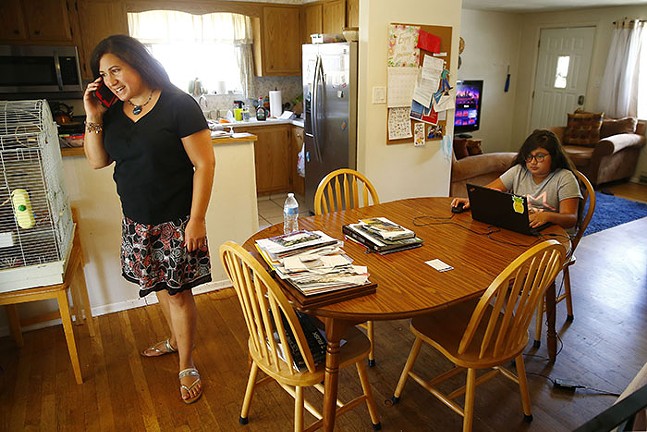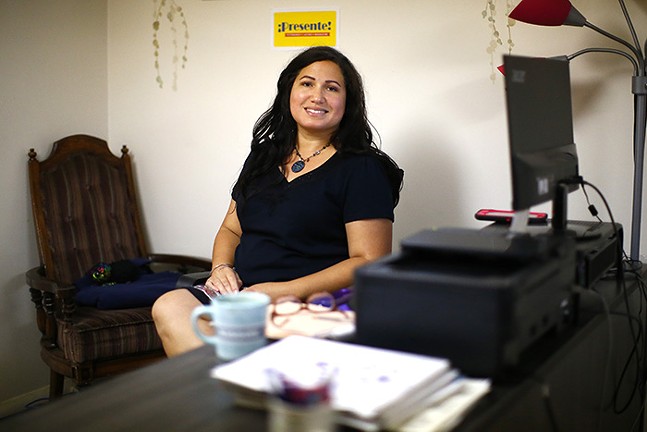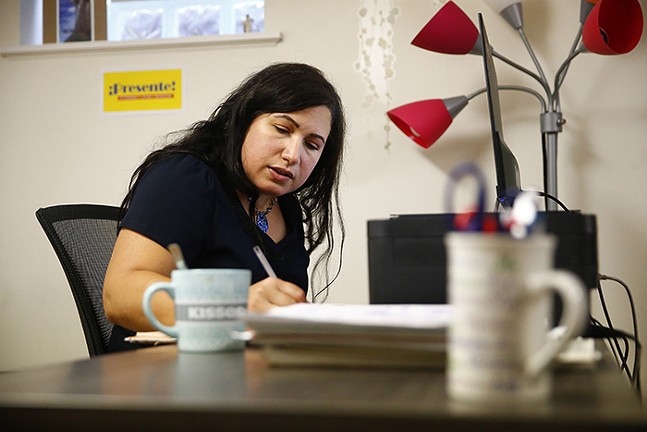“Instead of being fearful about what was different, I was curious. That’s something that I’ve brought with me throughout my life. This love for learning about others, and sharing what I know,” Manautou Matos says.
When she came to Pittsburgh from Puerto Rico in the 1990s to attend Carnegie Mellon University, Manautou Matos joined the Spanish and Latin Student Association (SALSA) and helped to put together CMU’s first ever Latin American Food Festival. Advertised with signs asking, “Do you know what Latin American food is? This is the real thing,” the festival brought people together to see the diversity of food, countries, and people that make up Latinx culture, and inspired Manautou Matos to keep sharing and keep educating.
She cites her spearheading of the festival as a main inspiration for her newest project — PRESENTE Pittsburgh Latino Magazine, an online Latinx culture magazine covering the Pittsburgh region, which she launched in March. The Latinx community is small in Pittsburgh, and many still have a lot to learn about its diverse culture. But with Pittsburgh’s Latino population growing relatively fast, Manautou Matos has been afforded an opportunity to not only to educate non-Latino Pittsburghers, but also serve a burgeoning community in the Steel City.
“Now, people are being more vocal, and people are more open to hearing about [Latino issues]. I think it’s the perfect time to just bring it out there, like hey, here is the Latino community, and here is what we are about, and here’s the impact we are having,” said Manautou Matos.
Since 2000, Latinos have been the second fastest growing ethnic group in the U.S., a fact that PRESENTE highlights on its mission page. In Allegheny County, they appear to be the fastest. According to 2018 census data, around 25,000 Latinos live in Allegheny County, which is just 2% of the county’s population, but still represents an increase of 40% from the 18,000 Latinos that lived here in 2010. Latinos are growing at a rate that’s slightly faster than Allegheny County’s Asian population growth.
PRESENTE’s goal is to serve “as a vehicle for regional Latinos to stay connected to important news, opportunities, and events, highlight their impact and accomplishments, thrive, and become key contributors to the regional economy, and celebrate and share their diverse cultural backgrounds,” according to its website.
Manautou Matos writes 75% of the content for the magazine, soliciting freelancers for most of the rest. She also built the website herself. PRESENTE was a way for her to bring together her passion for Latinx culture with her professional experience in multimedia and print marketing. She previously served as Marketing Director for Brightside Academy, and had worked in bilingual marketing and communications for years before launching PRESENTE.
Articles are written in both English and Spanish, so as to include multiple generations of Latinos and community members who may have varying language skill sets. The site was originally aimed in particular at highlighting Latinx cultural events in Pittsburgh.
“Something in common that I found over and over in talking with everyone was that they didn't know what was going on. I went to an event, and then I’d find someone and tell them about it, and they’d say ‘Oh, I had no idea. If I would have known, I would’ve gone,’” Manautou Matos said. “There were so many great things going on, professionals making great things for the community, and those things weren’t being publicized.”
Manautou Matos says that she has received a lot of help in getting PRESENTE off the ground, especially from Guillermo Velazquez of Pittsburgh Hispanic Development Corporation and Brent Rondon of University of Pittsburgh's Small Business Development Center.
The advent of the COVID-19 pandemic, which coincided almost immediately with the website’s launch, forced PRESENTE to change course and focus less on in-person events.
“I remember just sitting there in front of the computer and just being like, ‘Oh my God, what am I going to do?’” Manautou Matos said. “But I felt like I had to [cover it], and I wanted to, because I thought, ‘There’s going to be many people in the community that are not going to have any idea [what’s happening], or know about spread and things like that.’ So I wanted to keep them informed.”
As coronavirus and activist movements like Black Lives Matter came to the forefront, Manautou Matos formed partnerships with Spotlight PA and PublicSource to publish and translate some of their news articles on the PRESENTE website. She also interviewed members of community organizations like the Community Justice Project, a nonprofit law firm which is part of the Pennsylvania Legal Aid Network, to spread information about issues that affect the undocumented immigrant population of Pennsylvania.

CP Photo: Jared Wickerham
María Manautou Matos takes a phone call while her daughter Gabriella, 11, plays on the computer in their home in Allison Park.
The article also directed undocumented people in need of support to organizations like Casa San Jose, Latino Family Center, Latino Community Center, and PHDC for help with accessing health care.
Manautou Matos emphasized though that, in the context of the Black Lives Matter movement and amidst the increased nationwide discussion of systemic racism, every Latinos’ experience with race is different.
“Latinos can be of all races. They can be of African descent, they can be Indigenous, white, some are Asian. So the way that people experience racism and inequality really differs based on what they look like, unfortunately,” she said. “For instance, I have very curly hair, and I experience different things whether I have that curly hair or whether I’ve straightened it out. I definitely want to be a part of, through the magazine, partaking in the community of how we can help people, and to make things better for everyone in our community.”
In terms of content for the magazine, Manautou Matos has found ways to keep active even in quarantine. Stories explored local Latinx restaurants offering take-out options, a virtual Spanish-language small business seminar through the University of Pittsburgh, and a local artisan who started a leather goods shop in the middle of the pandemic.
PRESENTE is also part of the Pittsburgh Media Partnership, a collaborative of local news organizations in the Pittsburgh region (including Pittsburgh City Paper) aiming to help support journalists and independent press coverage in the area.
“Pittsburgh Media Partnership has been amazing for me as a newcomer to local media. They’ve been able to guide me — every now and then I’d have questions or a few roadblocks here and there — and the leadership there has been great,” Manautou Matos said. “It was great to sit down with people from all different media organizations in the region. In the beginning, I was hesitant. I’m a perfectionist, and if I do something, I want it to be good. And so many of them said ‘Do this, that’s great, just do it!’ And that kind of gave me that little push I needed to just go for it.”
The partnership also directed her to the Facebook Journalism Project grant for local newsrooms covering coronavirus issues, which she applied for in March and successfully received help to cover the cost of the magazine’s COVID-19 reporting.
So far, even though the magazine launched less than half a year ago, Manautou Matos has found the public response to be positive.
“I’ve heard many people say that we really needed this, and they’re glad that we now have something like this,” she said. Other Latinx media organizations have covered the Western Pennsylvania area, like La Mega Media in Ohio, but she considers PRESENTE to be unique — it’s an online, woman-owned, minority-owned, Pittsburgh-based magazine.
Other Pittsburgh Latinx organizations have emphasized the need for publications like PRESENTE to create community bonds.
“If we want to make Pittsburgh a welcoming city, we have to create outlets for our immigrant community to get accurate information in order to create more inclusivity and encourage civic and social engagement,” said Monica Ruiz, executive director of Pittsburgh Latinx community advocacy group Casa San Jose.
For now, PRESENTE is all online, but Manautou Matos is considering plans for a print newsletter once or twice a year, depending on how the pandemic progresses. She also hopes to work more with local Latinx businesses and find ways for them to be promoted in the magazine, and wants to grow her existing partnerships. A more immediate goal is to get the word out about the magazine and make it a place where people can come with their stories and questions.
“I think that many times the people who don’t know are fearful,” she said. “So a way for me to break through that fear is by showing these stories.”
PRESENTE. presentepgh.com



